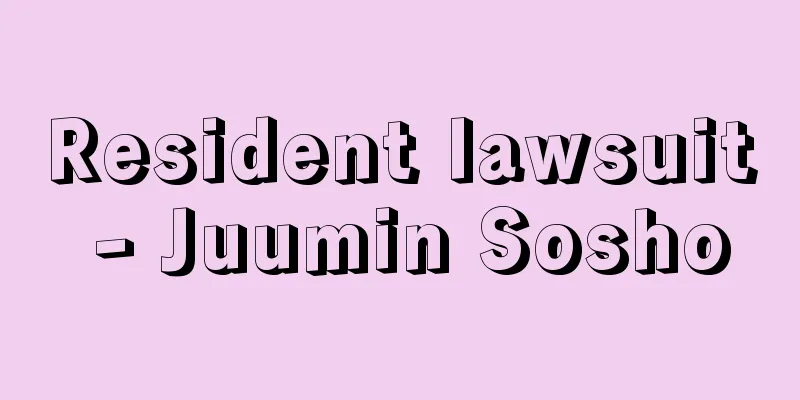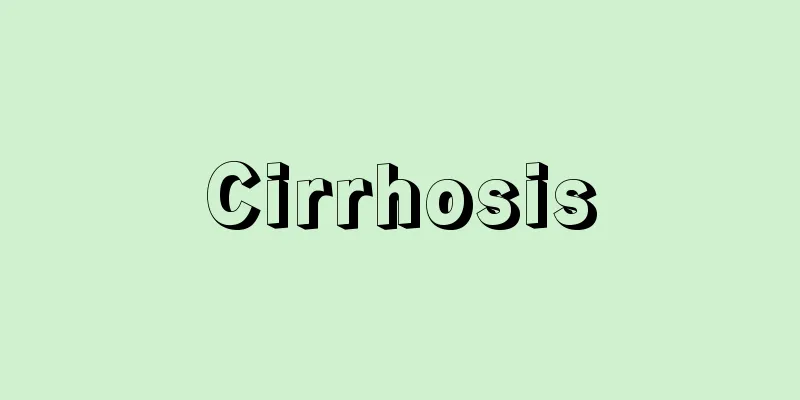Resident lawsuit - Juumin Sosho

|
This is a lawsuit in which residents can seek relief in court simply in their capacity as residents in order to protect the property of local public entities (prefectures, cities, towns, villages, special wards of metropolitan areas, associations, property districts, and local development corporations) for financial and accounting irregularities committed by those entities (Local Autonomy Law, Article 242-2). After the war, this system was introduced under the name of taxpayer lawsuits, modeled after the American taxpayers' suits, but since being a taxpayer is not a requirement for filing this lawsuit, the official name was changed to resident lawsuits when the Local Autonomy Law was revised in 1963 (Showa 38). It is a type of popular lawsuit in which any resident can bring a lawsuit, but in exchange, it has the restriction that only illegalities in the financial accounting of local governments can be challenged. Even if the residents win the lawsuit, the local government's assets are preserved, and the plaintiffs as individuals do not receive a single penny of profit; it is a purely public interest lawsuit. The significance of this system is that it allows residents to directly participate in the politics of local governments, promoting the interests of local governments, and in particular aims to prevent financial corruption in local governments. In order to file this lawsuit, it is first necessary to file a citizen audit request (Article 242 of the Local Autonomy Law). This is when the head, committee, commissioner, or employee of a local government is found to have illegally or unjustly spent public funds, acquired, managed, or disposed of property, concluded or performed a contract, or incurred debts or other obligations (including cases where it is reasonably certain that such acts will be performed), or when the facts of illegally or unjustly imposing or collecting public funds or neglecting to manage property are found, a citizen lawsuit is filed when the citizen is dissatisfied with the results of the audit request. Specific types of claims include injunctions, cancellation of administrative measures, requests for confirmation of invalidity, requests for confirmation of illegality of omissions, and claims for damages. The most commonly used is a lawsuit for damages. For example, it is used when the city sells city property at an unreasonably low price, purchases private land at an unreasonably high price, or pays employees extra-legal salaries (black market bonuses, etc.). Residents pursue these lawsuits on a so-called "bonus" basis, but if they win they can demand payment of attorney's fees from the local government. Resident lawsuits were not used much in the past, but they have been used more frequently in recent years, helping to prevent financial improprieties in local governments. At the same time, there has been a focus on the unclear interpretation of the distinction between contestable financial accounting matters and incontestable non-financial matters, the scope of liability for compensation for employees, and other issues. [Yasuhito Abe] [Reference] |Source: Shogakukan Encyclopedia Nipponica About Encyclopedia Nipponica Information | Legend |
|
地方公共団体(都道府県、市町村、都の特別区、組合、財産区、地方開発事業団)の財務会計上の違法について、住民が地方公共団体の財産を保全するために単に住民としての資格に基づいて裁判による救済を求めることができる訴訟(地方自治法242条の2)。戦後、アメリカのTaxpayers' suitに倣い、納税者訴訟の名のもとに導入された制度であるが、納税者であることはこの訴訟提起の要件ではないので、1963年(昭和38)の地方自治法の改正に際し正式名称を住民訴訟と称することになった。 住民ならだれでも訴えを提起できるといういわゆる民衆訴訟の一種であるが、かわりに、地方公共団体の違法のうち、財務会計上の違法しか争えないという制約がある。住民が勝訴した場合も地方公共団体の財産が保全されるだけで、原告個人は一文の利益も得ることはできないまったくの公益訴訟である。この制度は、住民が直接地方公共団体の政治に参加して、地方公共の利益を図ること、とくに自治体の財政上の腐敗の防止を目ざす点に意義がある。 この訴訟を提起するためには、まず住民監査請求(地方自治法242条)をする必要がある。これは、地方公共団体の長・委員会・委員または職員について、違法・不当な公金の支出、財産の取得・管理・処分、契約の締結・履行、債務その他の義務の負担がある(当該行為がなされることが相当の確実さをもって予測される場合を含む)と認めるとき、または違法・不当に公金の賦課・徴収、財産の管理を怠る事実があると認めるとき、これらを証する書面を添え、監査委員に対し、監査を求めるものである。住民がこの監査請求の結果に不服のあるとき提起する訴えが住民訴訟である。その具体的な請求の種類としては、差止請求、行政処分の取消し、無効確認請求、怠る事実の違法確認請求、損害賠償請求などがある。よく用いられるのは損害賠償訴訟である。たとえば、市の財産を不当に安く売却したり、不当に高く民有地を購入したり、職員に法定外給与(闇(やみ)ボーナス等)を払ったりした場合に利用される。住民はいわゆる手弁当でこの訴訟を進行するが、勝訴した場合は弁護士報酬の支払いを地方公共団体に求めることができる。住民訴訟はもともとそれほど活用されていなかったが、最近は頻繁に利用され、地方公共団体の乱脈財政の防止に寄与している。それとともに、争える財務会計事項と争えない非財務的事項の区別、職員の賠償責任の範囲などについて解釈上不明確な問題点のあることがクローズアップされてきている。 [阿部泰隆] [参照項目] |出典 小学館 日本大百科全書(ニッポニカ)日本大百科全書(ニッポニカ)について 情報 | 凡例 |
Recommend
Abalos Family - Abaloske
...It is known for its beautiful nature, hot spri...
Cownepole - Cownepole
Former name of the city of Kanpur in northern Indi...
Graves - Robert Ranke Graves
British poet. Born on July 24th in Wimbledon to a...
Permanent electoral register
A public register that registers the right to vote...
Dymecodon pilirostris (English spelling) Dymecodonpilirostris
…They leave the nest in about one month and live ...
Buddha place - Buddha
An organization that produces Buddhist statues. I...
Face of the underworld
An American film made in 1932. Original title: Sca...
Giant weevil - Giant weevil
An insect belonging to the family Curculionidae i...
Burmese characters - Burmese characters (English notation)
The national script of Myanmar (formerly Burma) us...
Ogaki Castle Town
...In Aono-cho in the west, there is the ruins of...
São Jorge da Mina (English spelling)
…The name El Mina (meaning "mine") come...
Long-tailed pangolin
Please see the "Pangolin" page. Source:...
Construction - Fushin
To invite the general public to work equally. Thi...
Sponge iron
This refers to a porous lump of iron obtained by l...
Sweet potato jelly - Sweet potato jelly
...For information on these sweets, which were so...









